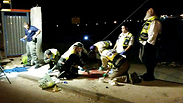
An escalation in current clashes with the Palestinians could see the resumption of low-level rocket fire on Israel from the Hamas-controlled Gaza Strip, a senior defense source warned Tuesday.
"There is concern over symbolic solitary rocket strikes from the Gaza Strip as an act of solidarity with the Palestinians in the West Bank and East Jerusalem, as we saw last weekend in Eshkol with the rocket fire carried out by Islamic Jihad," he said, adding that, "If Hamas could carry out attacks in the West Bank, it would."
Meanwhile, the security cabinet was to meet Tuesday at 3pm to discuss the escalation of recent days.
Defense Minister Moshe Ya'alon said Tuesday that Israel would act decisively to end the violence.
"We are in the midst of an escalation, and we will take a firm hand to stop this wave of violence, including more widespread arrests than in the past and the demolition of the homes of terrorists," he said following a situation assessment at the Etzion brigade. "The fate of any terrorist who raises his hand with a knife or uses a car to run people over is death."
Yaalon also said that there has been cooperation with the Palestinian Authority to stop the situation from deteriorating further.
"The Palestinian Authority and the bodies working on the ground to prevent escalation are conducting coordination meetings with us, despite the rhetoric by the leaders of the Authority calling for escalation."
There were multiple clashes across the West Bank on Tuesday, including an incident in which 21-year-old Mohammed Jawabara from the Al-Arroub refugee camp was shot dead near Gush Etzion junction, the site of Monday's terror attack that killed Dalia Lemkus. Dozens of Palestinians threw stones and Molotov cocktails at IDF troops, and the troops responded with riot-dispersal measures.
In the village of Dura, south of Hebron, some 150 Palestinians clashed with troops, close to the settlement to Negohot. The protesters threw stones and Molotov cocktails at Israeli cars. When they did not respond to riot-dispersal measures, soldiers directed live fire at the protesters' legs. As a result, a 15-year-old was seriously wounded and taken to Soroka Medical Center in Be'er Sheva. The hospital later said that the teen had sustained thigh wounds, and had been sedated and put on a ventilator.
Israeli security forces bolstered their presence in major cities and the West Bank on Tuesday, in the wake of the two deadly terror attacks on Monday, as Israelis cope with a growing sense of insecurity and the government strives to restore their sense of personal safety.
Police spokesman Micky Rosenfeld said Tuesday that police units have been deployed in cities, including Tel Aviv and Jerusalem, in response to the attacks. The IDF also says it has beefed up forces in the West Bank.
On Monday, a Palestinian from the West Bank city of Nablus stabbed a 20-year-old soldier Almog Shiloni at a crowded Tel Aviv train station. Shiloni later died of his wounds.
Hours later, a Palestinian wielding a knife stabbed three people at a bus stop next to the West Bank settlement of Alon Shvut, killing 26-year-old Dalia Lemkus. The attacks were latest in a string of terrorist acts that had hitherto targeted Israelis in Jerusalem and the West Bank.
The IDF is deploying hundreds of Golani Brigade soldiers who were training on the Golan Heights to Judea and Samaria in light of the deterioration in the security situation.
The troops were expected to be deployed in Gush Etzion, the site of Monday's stabbing attack, to bolster the security presence at hitchhiking posts and main routes in order to deter further attacks.
Prime Minister Benjamin Netanyahu convened a security meeting in his office on Monday night in Jerusalem and ordered a series of measures to be taken against terrorists, including the reinforcement of security forces in the West Bank and the ongoing demolition of the houses of terrorists.
On Monday night, security forces searched the Hebron home of the terrorist who carried out the Gush Etzion attack, searching for evidence that the attack had been planned ahead of time. His family members were not arrested.
Tel Aviv residents have began to voice concern for their safety; Monday's attack marked the first in the metropolis since the start of the wave of terrorism that has swept Jerusalem and its nearby settlements.
"It's not pleasant at all," said Amnon Hazbeni, a resident of Kiryat Motzkin who passes through the Haganah train station every day on his way to work.
"I take this path every day and the feeling is a sense of lawlessness, that the government is not doing enough to protect its citizens," Hazbeni said.
Eitan, a resident of Lod, also expressed concern as he uses the train station where the attack occurred on Monday every day. "I left the train station now and looked right and left, I was not indifferent like I usually am. We are seeing that (the attacks are) going beyond the borders of Jerusalem, (they) have arrived in Tel Aviv, and this means it is not the end," he said.
"An appropriate response is required here. These are attacks that are very hard to stop and I am very hesitant of the situation," Eitan added.
Another Tel Aviv resident, identified only as Etgar, echoed the sentiment of fear and uncertainty growing in Tel Aviv.
"I was really stressed. I will certainly raise my level of awareness from now on," Etgar said. "On the other hand, it could happen anywhere, in every city. We must try to be careful as much as is possible. I think that crowded stations should have
police present. At least for me it will give a sense of security that kind of disappeared today."
The Associated Press contributed to this article















